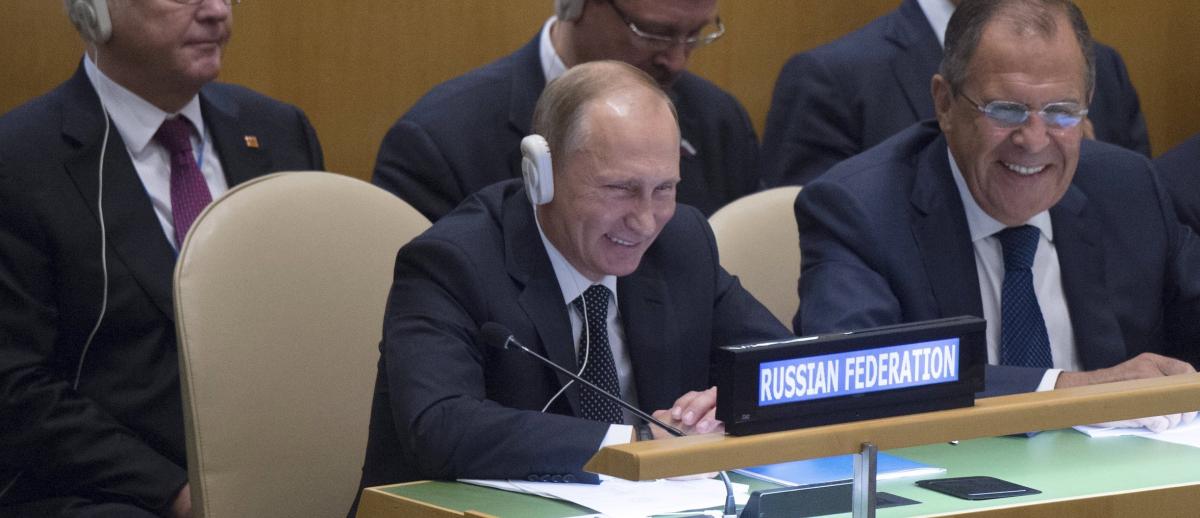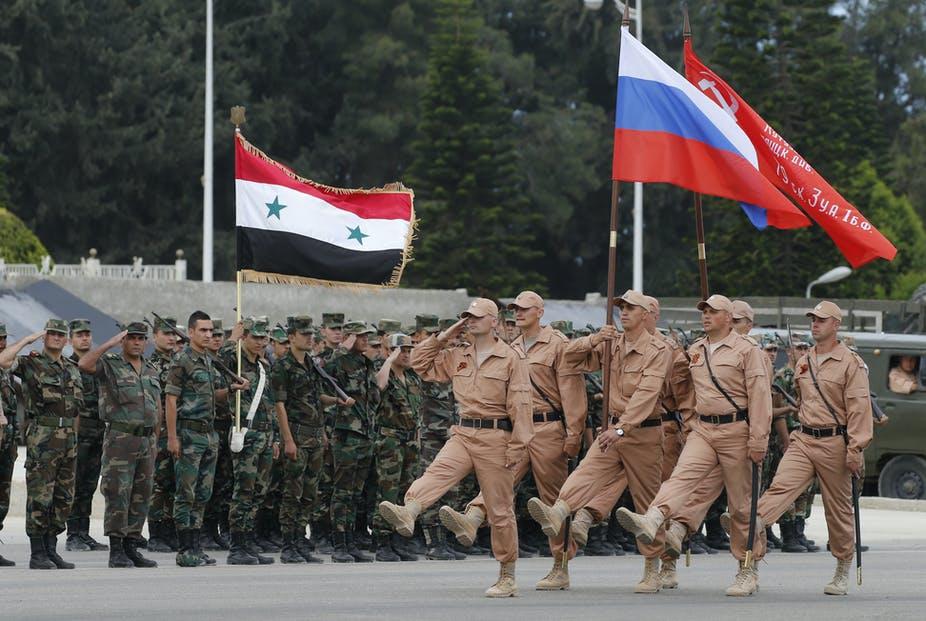Russia’s Greatest Weapon: Political Cynicism in a Time of Uncertainty
archive


Vladimir Putin and Sergey Lavrov, the Minister of Foreign Affairs (right) with Russia’s delegation at the 70th UN General Assembly session on September 28, 2015, where Putin accused NATO countries of staging the conflict in Ukraine. (Reuters)
Russia’s Greatest Weapon: Political Cynicism in a Time of Uncertainty
It seems that no amount of international backlash can discourage Russian policymakers from challenging the liberal world order with the United States (nominally) at its helm. Instead, Russia’s campaign of international subversion has become increasingly daring and provocative. In June 2020, U.S intelligence sources revealed reports of Russian plans to pay Taliban militants to target American soldiers in Afghanistan.1 In August, Russian armored vehicles intentionally rammed American patrol cars in Syria, injuring American troops.2 Yet these unsettling provocations generated a muted response from the White House where President Donald Trump remains distrustful of U.S. intelligence while heeding the Kremlin’s self-absolving explanations.3 Russia therefore has managed to escape such controversies virtually unscathed and ever-confident in its impunity.
What could explain the United States’ passivity? While many analysts point to the distractions of the COVID-19 pandemic and President Trump’s peculiar disposition toward Putin, it appears that Russia has accomplished its foreign policy objectives by deploying its greatest weapon of all: cynicism. For years, a sophisticated campaign of informational manipulation, state propaganda, and lies have enabled Russian policymakers to legitimize Vladimir Bartol’s infamous credo: "Nothing is true; everything is permitted."4 Although the motto originated in Bartol’s fictional writing, the Kremlin’s foreign policy has employed this philosophy for genuine geopolitical gains.
Russia’s victories have perhaps been most palpable in Ukraine, where the conflict in the Donbass has continued to fester since Russian-backed separatists declared independence from Kyiv in 2014.5 In October 2019, Russia pressured Ukraine into accepting the terms of the Steinmeier Formula, which outlined a road-map to peace through fair and transparent elections in the Donbas under the supervision of the Organization for Security and Co-operation in Europe (OSCE). These elections were to be preceded by a ceasefire, withdrawal of Russian-backed troops, and restoration of Ukrainian control over the border with Russia.6 However, stark disagreements concerning the sequence of implementation have resulted in chronic gridlock. The political dead-end is further exacerbated by Russia’s complex military maneuvers and relentless campaign of informational malfeasance that exonerates the actions of the rebels while putting responsibility for the failure to find a mutually acceptable solution on Ukraine. Consequently, Russia has divided Ukraine’s European allies while derailing U.S. interest in the conflict altogether. This perpetual deadlock is the optimal outcome for Russia’s geopolitical vision for eastern Ukraine, allowing Russia to play the role of a peacemaker while integrating the Donbas into its sphere of influence and barring the government in Kyiv from achieving true territorial sovereignty.
Similarly, the tactics of informational obfuscation, competing narratives, and bending of the truth have allowed Russia to entrench its influence in Syria. Unapologetically cynical about democracy, the Kremlin touts the dictatorial rule of Assad’s government as the only viable option for restoring order and stability in the country. At every stage of the Syrian war, Russia dismissed allegations of Assad’s use of chemical weapons, lied to the international community concerning the atrocities committed by the regime’s forces, and mocked the pro-democracy factions engaged in the conflict.7 Russia’s undeniable status as a political power-broker in Syria gained additional credibility in the aftermath of the haphazard withdrawal of U.S. forces from the country in October 2019. The American departure betrayed U.S. allies inside Syria, forcing them to turn to Russia and Assad for protection against imminent Turkish invasion.8 Unlike the majority of the international community, the Kremlin has no qualms about preserving the dictatorial status quo in the country and generally regards the popular aspirations for political freedom and civil liberties as naive. Unable and unwilling to offer a political alternative, the U.S. and much of Europe have accepted Russia’s policy formula that promotes stagnant and brutal authoritarianism of the Assad regime in exchange for relative peace in the country.

Russian and Syrian soldiers during a rehearsal for a military parade at Hmeimim airbase, Latakia, Syria in May 2016. (Photo: Sergei Chirikov/EPA)
Libya became the latest country in the Middle East where the politics of cynicism and duplicity allowed Russia to accumulate enough political capital to exploit the country’s factionalism amidst the protracted civil war. Libya is split between the forces of the Lybian National Army (LNA) under General Khalifa Haftar and the Lybian Army loyal to the UN-recognized Government of the National Accord (GNA). Following the unanimous adoption of Resolution 2259 by the UN Security Council in December 2015, Russia unambiguously recognized the GNA as “the sole legitimate Government of Libya” and called on all countries “to cease support to and official contact with parallel institutions claiming to be the legitimate authority.”9 However, Russia’s commitment to respect the GNA’s authority remains at best symbolic. Covertly, the Kremlin has taken a more aggressive approach in support of Haftar’s army through the assistance of Russian private military companies like the Wagner Group. As of May, reports show that this private military contractor has deployed over 1,200 mercenary troops and a significant military arsenal into Libya. 10 The delivery of arms and mercenary troops occurred in direct contradiction of UN Security Council Resolution 2473 which extended an arms embargo against Libya, a measure that Russia has publicly supported.11 Yet, despite overwhelming evidence to the contrary, Russia has vehemently denied any connection to the group. In a response to accusations of Russia’s meddling in Libya by Arab media, for example, Russia’s Ministry of Foreign Affairs stated: “There is not a single Russian serviceman in the area of the military conflict in Libya… These planted reports are aimed at creating a misconception that Moscow is allegedly interfering in the domestic Libyan armed conflict by openly siding with one of the parties.”12
This cynical denial is aimed not so much at disproving the allegations of Russia’s assistance to General Haftar’s forces, but rather at sustaining the air of plausible deniability for the consumption of the Kremlin’s sympathizers both at home and abroad. By inundating the domains of publicly available information with official and unofficial narratives, the Russian government is able to deflect criticism, manipulate public opinion, dissimulate its intentions, and continue using mercenaries as “a cheap, low-risk front to carry out its activist foreign policy.”13 As a consequence, Russia received little international reprimand for its subversive involvement in the Libyan civil war.
By inundating the domains of publicly available information with official and unofficial narratives, the Russian government is able to deflect criticism, manipulate public opinion, [and] dissimulate its intentions...
Overall, Russian foreign policy has achieved undeniably remarkable successes while incurring relatively mild setbacks. Despite international sanctions and the volatility of the global oil market, the Kremlin has demonstrated an unwavering willingness to sacrifice its economy and reputation in exchange for long-term geopolitical victories. However, Russia’s successes were not due to its military strength, its economy or technological innovations, nor was it the power of its political institutions. Rather, its greatest weapon is a mixture of malevolent political cynicism and robust informational nihilism. These values reject humanitarian idealism as naive and portray democracy as a prelude to inevitable social degradation and political chaos. More than a tactical geopolitical assertion of superpower status, Putin’s foreign policy is a deliberate challenge to the liberal world order. Moreover, Russia’s expanding influence comes at the very moment when the United States appears to be abdicating its leadership role among the Western powers. Indeed, the Trump administration has failed to identify, let alone to counter Russian threats and it has been unable or unwilling to produce a cohesive policy capable of meeting Russian provocations. Moreover, the Kremlin’s insistence on the irrelevance of truth has already found a hospitable audience in American political debate.
Given the scope and alarming implications of Russia’s campaign of international subversion and informational manipulation, how can democracies respond to the challenge of pervasive political cynicism, authoritarianism, and the erosion of truth as an indispensable value for any type of social contract between a government and its citizens? The world today can do without another arms race. In fact, added military and political tension can only serve to deepen Russia’s long-standing geopolitical grievances and connivance. Instead, we must collectively reaffirm our commitment to personal freedom, civil liberties, political pluralism, and transparency as foundational values that transcend national differences and unite global civil society in pursuit of a just, multilateral, and humane world order.
1. Savage, Charlie, Eric Schmitt, and Michael Schwirtz. “Russia Secretly Offered Afghan Militants Bounties to Kill U.S. Troops, Intelligence Says,” New York Times, June 26, 2020. https://www. nytimes.com/2020/06/26/us/politics/russia-afghanistan-bounties.html
2. Marcus, Jonathan, “Syria war: American troops hurt as Russian and US military vehicles collide,” BBC News, August 27, 2020, https://www.bbc.com/news/world-middle-east-53930795
3. Davis, Julie, “Trump, at Putin’s Side, Questions U.S. Intelligence on 2016 election,” July 16, 2018.” https://www.nytimes.com/2018/07/16/world/europe/trump-putin-election-intelligence.html
4. Bartol, Vladimir, Alamut (North Atlantic Books, 2007). Vladimir Bartol (1903-1967) was an author of Slovene origins.
5. Masters, Jonathan, “Ukraine: Conflict at the Crossroads of Europe and Russia,” Council on Foreign Relations, February 5, 2020, https://www.cfr.org/backgrounder/ukraine-conflict-crossroads-europe-and-russia
6. Ukraine conflict: Can peace plan in east finally bring peace?” BBC News, December 10, 2019, https://www.bbc.com/news/world-europe-49986007
7. Loveluck, Louisa, “Russia Vetoes UN Resolution to Continue Syria Chemical Weapons Investigation.” Washington Post, October24, 2017, https://www.washingtonpost.com/world/middle_east/russia-vetoes-un-resolution-to-continue-syria-chemical-weapons-investigation/2017/10/24/63e52470-b8c6-11e7-9b93-b97043e57a22_story.html
8. Hubbard, Ben and Anton Troianovski, Carlotta Gall, and Patrick Kingsley, “In Syria, Russia Is Pleased to Fill an American Void,” New York Times, October 15, 2019, https://www.nytimes.com/2019/10/15/world/middleeast/kurds-syria-turkey.html
9. United Nations. Security Council. "Unanimously Adopting Resolution 2259 (2015), Security Council Welcomes Signing of Libyan Political Agreement on New Government for Strife-Torn Country." News release, December 23, 2015. United Nations. Accessed September 15, 2020. https://www.un.org/press/en/2015/sc12185.doc.htm.
10. Nichols, Michelle, “Up to 1,200 deployed in Libya by Russian military group: U.N. report,” Reuters, May 6, 2020, https://www.reuters.com/article/us-libya-security-sanctions/up-to-1200-deployed-in-libya-by-russian-military-group-u-n-report-idUSKBN22I2XW
11. Security Council resolution 2473, The Situation in Libya, (10 June 2019), available from http://unscr.com/en/resolutions/2473.
12. Ministry of Foreign Affairs of the Russian Federation, Publications in Arab media regarding Russian nationals involvement in the military operation in Libya, (Moscow, Russia: 2019).
13. Stronski, Paul, “Implausible Deniability: Russia’s Private Military Companies,” Carnegie Endowment, June 2, 2020, https://carnegieendowment.org/2020/06/02/implausible-deniability-russia-...




